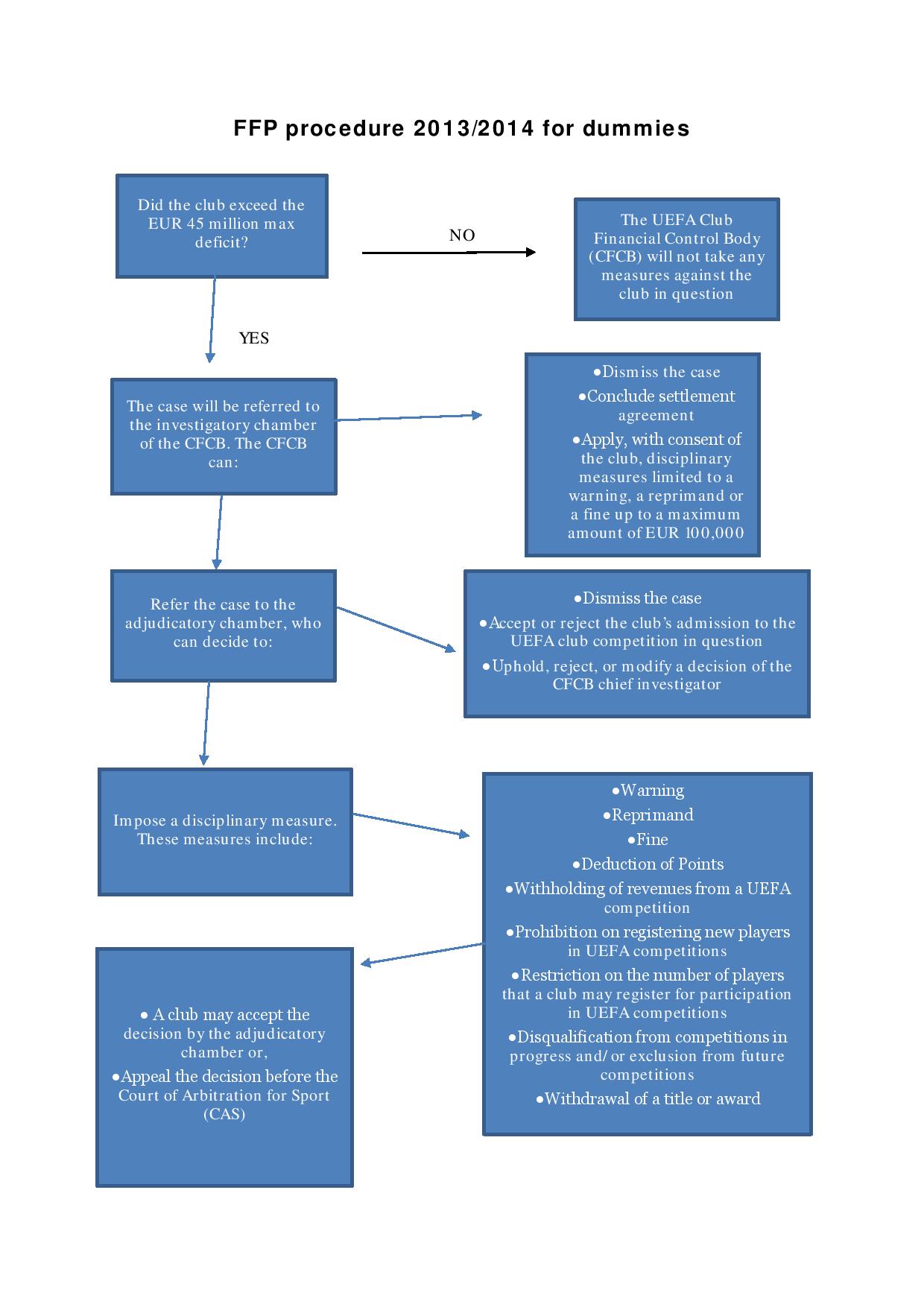Football-wise, 2014 will not only be remembered for the
World Cup in Brazil. This year will also determine the credibility of UEFA’s
highly controversial Financial Fair Play
(FFP) Regulations. The FFP debate will soon be reaching a climax, since up to 76 European
football clubs are facing sanctions by the UEFA Club Financial Control Body (CFCB).
This large number of clubs includes two heavyweights: Manchester City and Paris
Saint-Germain. On paper they face a potential disqualification from one or more
editions of the UEFA Champions League. This would most certainly jeopardize the
great ambition their billionaires-owners have for them and would vindicate FFP
as a powerful mechanism capable of reigning in even the world’s richest
football clubs. Whether this will indeed occur shall remain uncertain until the
beginning of May, when UEFA is expected to
announce the details of the (potential) disciplinary sanctions. However, in
order to grasp the likely consequences of a sanction we offer you the
definitive short introduction to FFP.
It is in the view of curtailing the, sometimes
dramatic, losses made by an increasing number of football clubs, that UEFA’s
Executive Committee decided to introduce the FFP Regulations in May 2010. The stated
aims of FFP, stipulated in Article 2 of the Regulation include, inter alia, improving the economic and
financial capability of the clubs; increasing their transparency and
credibility; introducing more discipline and rationality in club football
finances; encouraging clubs to operate on the basis of their own revenues; and
protecting the long-term viability and sustainability of European club
football. On UEFA’s own website a further aim was mentioned, namely to
decrease pressure on salaries and transfer fees.
To achieve these aims, UEFA has introduced the break-even requirement[1].
By this requirement, clubs must demonstrate that their revenue exceeds or
equals expenditure. The club’s spending on transfers and employee benefits
(including wages) will be counted as expenditure, whereas income from gate
receipts, TV revenue, advertising, merchandising, sales of players, and prize
money is regarded as revenue. Any money spent on infrastructure, training
facilities or youth development will not be included in the assessment.
In accordance with article 68 of FFP Regulations and
article 3 of the Procedural rules
governing the UEFA Club Financial Control Body, the CFCB is competent to inter alia determine whether clubs
fulfil the break-even requirement and impose disciplinary measures in the event
of non-fulfilment of the requirement. A first assessment is undertaken by the investigatory chamber, which leads the
monitoring process, the investigation proceedings, and collects evidence. At
the end of the investigation, the CFCB chief investigator, Jean-Luc Dehaene, after
having consulted with the other members of the investigatory chamber, may
decide to: (a) Dismiss the case; (b) Conclude, with the consent of the club in
question, a settlement agreement; (c) Apply, with the consent of the club in
question, a disciplinary measure limited to a warning, a reprimand or a fine up
to a maximum amount of EUR 100,000; or (d) Refer the case to the adjudicatory chamber.[2] It
should be noted that this is the phase the 76 clubs find themselves in right
now.
Should the investigatory chamber decide to refer the
case to the adjudicatory chamber, then the adjudicatory chamber can decide to:
(a) Dismiss the case; (b) Accept or reject the club’s admission to the UEFA
club competition in question; (c) Impose disciplinary measures; or (d) Uphold,
reject, or modify a decision of the CFCB chief investigator[3]. A
final decision by the adjudicatory chamber will be made before the end of the
current season at the latest.
Concerning more specifically the disciplinary
measures, Article 29 of the Procedural rules provides a long list of potential
measures including fines, deduction of points, withdrawal of a title or award
and disqualification from competitions in progress and/or exclusion from future
competitions. Undoubtedly, for teams like Manchester City and Paris
Saint-Germain whose greatest ambition is to be successful in Europe’s most
prestigious tournaments, a disqualification from European competitions would be
the most severe disciplinary sanction possible.
Furthermore, the Procedural rules governing the UEFA
Club Financial Control Body give the sanctioned party the possibility to appeal
against the decision. The appeal should be launched in accordance with article
34 of the Procedural rules, which states that final decisions of the CFCB may
only be appealed before the Court of Arbitration for Sport (CAS) in accordance
with the relevant provisions of the UEFA Statutes.
Whether the CAS will have to pronounce itself on a
specific case regarding FFP in the upcoming months will largely depend on the scope
of the decisions adopted by the investigatory chamber later this week and then by
the adjudicatory chamber in the upcoming month. The effectiveness, credibility and,
more broadly, the future of the FFP Regulations are at stake. This is either
the beginning of the end for FFP or the end of the beginning.
A
story to be continued…

[1] UEFA Club Licensing and Financial Fair Play
Regulations. Edition 2012, Articles 58-63
[2] UEFA Procedural rules governing the UEFA Club
Financial Control Body. Edition 2014, Articles 12-14
[3] Ibid, Article 27